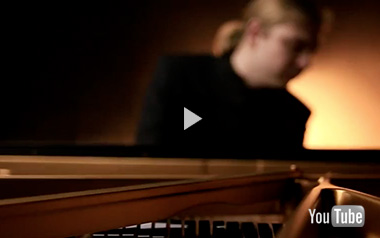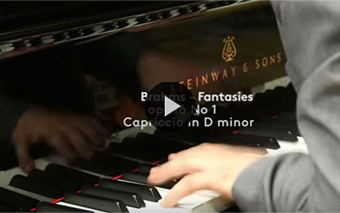Next Concerts
February 19, 2026
Odense
Odense C, Denmark
Ravel: Piano Concerto in G major, M.83
– Pierre Bleuse (conductor)
Venue: Odense Concert Hall, Odense
Mar 7, 2026
Netherlands Philharmonic / European Tour
Amsterdam, Netherlands
Brahms: Piano Concerto No.2 in B-flat major, Op.83
– Lorenzo Viotti (conductor)
Venue: The Concertgebouw, Amsterdam
REVIEWS
Mar 15 2011
Munich Herkulessaal / Haydn, Brahms, Liszt
“It quickly became apparent during his recital at the Herkulessaal that Denis Kozhukin is a marvellous pianist. Anyone who can play a selection from Liszt’s ‘Etudes d’exécution transcendente’ so brilliantly has no technical limitations. Anyone who can shape the various lines and layers of sound in the densely packed movement of Brahms’ Sonata in C major Op. 1 with such vividness, and without missing a single musical detail, demonstrates a truly substantial musical understanding that really gets to the bottom of the piece.
His Haydn was inspiring: Kozhukin measured the tone with such precision that the colours and contrasts were perfectly weighted, both in the lively opening movement and the austerely performed adagio.”
– Suddeutsche Zeitung
Oct 29 2010
Recital at Theatre des Bouffes du Nord, Paris / Haydn, Schumann, Mussorgsky
“The second half was excellent. Kozhukin gave a dazzling performance of his compatriot Modest Mussorgsky’s ‘Pictures at an exhibition’; creating a cosmic and grandiose vision with his resourceful playing, light touch and a palette of colours worthy of a young Sviatoslav Richter. Kozhukin attempted to hold back time, offering three encores which all confirmed his future promise: a breathtaking ‘Escalier du diable’ by Ligeti, a powerful performance of Taneïev, and to conclude, a peaceful arrangement of Bach by Siloti. Kozhukin is definitely one to watch.”
– Anaclase.com
Aug 01 2010
Queen Elisabeth Competition
“Denis Kozhukhin performed Haydn’s Sonata in E flat major Hob. XVI:49 with such subtlety, such carefully-judged pacing and such attention to detail that one felt transported back to the Classical period. His rendition of ‘Target’, too, came across as a thoughtfully conceived interpretation. But it was his rendition of Prokofiev’s Second Concerto that stole the show – and the competition. The work evolved like an epic journey, and throughout everything was perfectly paced so that dramatic climaxes were unleashed with force of a tornado.”
– International Piano Magazine, July/August 2010
“It rapidly became obvious to both audience and jury during Denis Kozhukhin’s performance that he unquestionably had that certain ‘je ne sais quoi’, so impossible to define, which characterises a truly musical personality, standing head and shoulders above the competition, talented though they all were.
To begin, Kozhukhin played Haydn’s piano sonata in E flat major. He played with such serenity and mastery of both technique and effects; every element of the sonata was given its proper place. After an opening of extreme lightness, delicacy and tenderness, the tone grew in richness. This was followed by the set work, ‘Target’, by the 23 year old Korean composer Jeon Minje. In this complex piece of multiple realities and percussive impressions, Denis Kozhukhin really made himself heard. Not just in the literal sense, but in the figurative sense also, giving a highly personal performance of a work which he had made his own in the space of just one week. His final piece, like two other competitors, was Prokofiev’s 2nd piano concerto. He had such presence and such authority; inspiring an orchestra and a conductor who had not always shared the artistic vision of and close relationship with the other candidates. In a wonderful dialogue with the orchestra, Kozhukhin revealed the many facets and treasures of this concerto, which in turn revealed what a marvellous musician Kozhukhin himself is.”
– Luxembourger Wort, May 2010
“As his performance progressed, it became more and more obvious that Kozhukhin paired his musicality with an integrity and a humanity that guard him from the danger of becoming a piano-playing machine. His inner calm never deserted him, even in the wild developments of Prokofiev’s 2nd piano concerto, or the series of percussive chords in the set piece ‘Target’ by Jeon Minje. The Orchestre National itself was won over by his natural authority, and delivered a faultless performance for him, allowing him to deploy his full range of aural wizardry – but in his own particular style; simple and devoid of superfluity. The various phrases in the Haydn sonata were imbued with colour, and responded one to another other in perfectly balanced dialogue between right and left hands. Both the pieces and the overall programme showed an intelligence of construction, building an arch from the alpha of the Haydn to the omega of the Prokofiev. By 11.30pm on Saturday 29th May, there could be no doubt: the Queen Elisabeth piano competition of 2010 had found its winner.”
– Le Soir, May 2010
“Denis Kozhukhin was incontestably the winner. Those who had already heard him in the semi-finals had singled him out. … and we sensed from the very first bars of his initial Haydn sonata that he was indeed outstanding: a true musician, in fact. His technique, his virtuosity, his complete control of the tone and the clarity of his interpretation were means to serve the music, and not ends in themselves.
He demonstrated a calm maturity, and entered into a real dialogue with the orchestra in Prokofiev’s 2nd piano concerto, spurring them on. This was a magnificent partnership between soloist and orchestra. Kozhukhin was also clearly very aware of, and motivated by, the audience’s presence, and built up a wonderful relationship with them.”
– La Voix, May 2010
“Denis Kozhukhin’s win is incontestable, and is compounded by his incredible popular success. The Russian pianist plotted a flawless route through the competition, where his radiant musicality was unceasingly served by stunning technical mastery. There is a joy in his playing which drives him right to the very essence of the possibilities contained within a score.
At the age of only 23, he is already in the company of the greats with his combination of moral strength and gentleness.”
– Le Soir, May 2010
“It is very difficult to sum up (or indeed analyse) Denis Kozhukhin’s playing in writing. His performance of Haydn’s piano sonata in E flat major, Hob.XVI:49, was the very essence of clarity, simplicity and wit. But why? Was it the tone? The tempo? We weren’t hearing a particular pianistic timbre, but rather the voice of someone speaking, or of a soul expressing itself. But if you listened carefully, you could identify a peaceful tone, full of nuance, colour and intensity; faithful in the utmost to the score. The tempo was simply right – slower than the extravagant speeds we had encountered over the past weeks from other competitors – a sign that the pianist felt connected with the composer’s intentions, and was confident in his interpretation. The final minuet, simple in the extreme (even a beginner could play it) was simply electrifying, and was followed by complete silence from the audience.
Kozhukhin’s was the 12th interpretation of ‘Target’ to be heard, which incidentally wasn’t played from memory by any of the competitors. His performance revealed what could well be the piece’s defining structure: a succession of individual tableaux, each with its own characteristic ambience, and through which the visionary power of the pianist unveiled a hitherto undiscovered lyricism and an overbearing tension (like a galvanised Marin Alsop!). After a sombre and inspired cadence came a dazzling conclusion.
Kozhukhin gave the second performance of Prokofiev’s 2nd piano concerto that night; it was similar to that of Claire Huangci in its interpretation, but at the polar opposite in its energy. From the opening melody, Denis whisked all those around him – conductor, orchestra, audience and jury – off on an epic adventure whose itinerary, although theoretically familiar, gradually seemed to enter the unknown. The scherzo had an integrity of its own, delivered without excessive haste, like a dream. The intermezzo was taken to the edge of the extreme: a dance for bears who finally took their leave on the tips of their toes. The finale was broad, powerful, at its ease, and organically connected with the orchestra; the final presto was dazzling. Kozhukhin received a standing ovation from an enraptured audience.”
– La Libre Belgique, May 2010
Jun 30 2010
Recital at Zankel Hall, Carnegie Hall, New York Haydn, Schumann, Mussorgsky
“A Haydn Sonata Accented With Ingenuity.
Less than a month after winning first prize in the prestigious Queen Elisabeth Piano Competition in Brussels, the young Russian Denis Kozhukhin … gave formidable, freshly considered accounts of two challenging staples: Schumann’s ‘Symphonic Études’ and Mussorgsky’s ‘Pictures at an Exhibition.’ yet it was his sensitive playing of a much more modest work — Haydn’s Sonata in E flat (Hob. XVI:49), which opened the program — that left the strongest impression of Mr. Kozhukhin’s gifts and potential.
He took a genial, unrushed approach to the opening Allegro, allowing ample time for melodic phrases to breathe. Trills and turns were dispatched with lyrical grace; chords were voiced to bring out harmonic nuances. Haydn plays a game near the end of the first movement, which seems about to stop several times. Mr. Kozhukhin did not overdo the humor, choosing instead to highlight the musical ingenuity in each turn of phrase. He captured the Beethovenian grandeur of the pensive slow movement and played the finale, a playful homage to a courtly minuet, with crisp articulation and high spirits.
Mr. Kozhukhin already has all the technique he will ever need. His first teachers were his parents. At 14 he graduated from a Russian conservatory and moved to Madrid to further his studies and broaden his outlook. Lanky and relaxed, with long blonde hair pulled back in a ponytail, he looked completely comfortable at the piano. He began the Schumann without taking a break after the Haydn, without even waiting for latecomers to settle into their seats.
Even in the most hypercharged of the études, which abound in leaping chords and rippling, intricate passagework, Mr. Kozhukhin played commandingly. He set a bracing tempo in the final march yet managed to bring out chromatic details and inner voices.
After ‘Pictures’, he played that Ligeti étude as an encore, thrillingly.”
– New York Times
Jun 20 2010
Royal Flemish Philharmonic / Edo de Waart / Brahms Piano Concerto No.2
“The jury (of the Queen Elisabeth Competition) awarded the highly deserved first prize to Denis Kozhukhin, already a seasoned pianist. This young musician proved his worth with Brahms 2nd piano concerto. To sum the performance up in a few words; it boasted a full sound, virile and intense playing, and clear intentions. Kozhukhin mastered the piece with exceptional composure, and beyond his technically brilliant performance of this titanic concerto, he remained above all a musician. The occasionally harsh tone of his playing was ideally suited to Op.83, and yet he was also capable of beautifully delicate and light playing when required. He brought out the fierce poetry of the piece with a simplicity and authority which augur a great future for this young pianist who is still only 24 years of age.”
– Concertclassic.com


